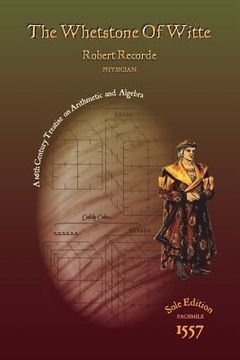Synopsis "The Whetstone of Witte"
The sole edition of Robert Recorde's The Whetstone of Witte was printed at London by John Kingston in 1557. One of Recorde's concerns in this book is to develop not only a means of representing powers of numbers, but also a means of naming them. Prior to the development of a numerical index notation, the names given to the powers was of considerable importance. Hence in these pages we find terminology which is now archaic, for instance the strange word zenzizenzizenzike, the name for the eighth power of a number. It is generally acknowledged that Recorde's treatise on algebra, in the section entitled The arte of cossike numbers, is the first to be printed in the English language. Although this work owes much to the German mathematicians Christoff Rudolff and Michael Stifel, it does have one well known claim to originality; the first use of two parallel lines as the sign for equality (because noe 2 thyngs, can be moare equalle). Recorde's invention of the equals sign =, together with his adoption of the + sign (which betokeneth more) and the minus sign - (which betokeneth less) placed him at the very forefront of European practice. Like most of Recorde's books, The Whetstone is written in the form of a dialogue between a learned master and a clever, but rather precocious, scholar. After being patiently encouraged through the seconde parte of arithmetic (begun by the scholar in Recorde's first book, The Grounde of Artes) followed by the extraction of rootes, the scholar remarks 'I am moche bounde unto you ... Trusting so to applie my studie, and emploie my knowlege, that it shall never repente you of your curtesie in this behalfe'. To which the master, about to start an exposition on the difficult and strange cossike arte (algebra), replies 'Then marke well my words, and you shall perceive, that I will use as moche plainesse, as I maie, in teaching: And therefore will beginne with cossick numbers first'. Here Recorde is again using terminology that is now archaic. In his day algebra was called the cossic art, derived from the Latin cosa, meaning 'thing'. The Whetstone also includes a lengthy treatise on the arte of surde nombers, that is, on irrational numbers.

